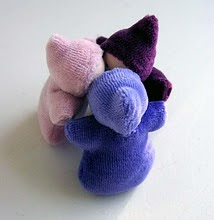I was a reader of stories for most of my life, but I was not always a storyteller. In fourth grade, I attended school assembly that featured traveling minstrels. They told stories and used their instruments for sound effects and mood control. At one point, they asked for a volunteer from the audience to tell a story. I volunteered. I was pretty shy as a rule, but I thought that storytelling was one of the few things I could do. I opened my mouth to begin, and nothing came out. I tried again. My mind was blank. I felt wretched, and I wanted to sit back down. Really, I wanted to run away.
One of the musicians said, “Why don’t you ask a friend to help you?” Jenny, who was sometimes my friend, but who was always cool, stood up and said that we could tell Jackie Torrence's ghost-story called “Lavender.” (If you can find an out-of-print audio-cassette copy, the story is on Torrence’s album called “Jump Tales.”) As Jenny began the story of the mysterious woman who appeared on the road to ask for a lift from a driver, my memory returned, and I was able to continue the story. Still, the experience was humiliating to me. I decided that I couldn’t tell stories. Despite a few feeble attempts in college, I just didn’t have the knack.
Then, in library school, I took a storytelling course by Anne Sheldon. (Memo to Anne: you really need a website so I can link to you properly!) Our one required textbook was Margaret Read MacDonald’s Twenty Tellable Tales, but Anne gave us many resources to look for stories we’d like to tell. Our first story was “The Little Rooster and the Diamond Button.” Anne told it to us once, and then had us go around the room telling different parts of the story. It didn’t matter that we stumbled and fumbled, forgot and embellished. We got over our initial fears in a safe setting. Anne told us that most people could become good storytellers and a few people could become great storytellers. What was important was finding stories we loved to tell, learning them, telling them, and telling them again.
I gained so much confidence during that storytelling course. A librarian friend of mine was not so lucky in her class a few states North from me: the professor gave my friend a “B” and said she would not make a good storyteller because her voice was squeaky. (This is not true! Rather, I suspect the professor made my friend nervous, and her voice went up as a result.) Please, be wary of those experts who offer unconstructive criticism. If you want to tell stories, I give you whatever permission you need to do so. I’d recommend practicing on kindly friends first. They are a bit more detached from you than family members, and they are great at letting you start over, forget, stumble, remember, and move on. Memorize your beginnings and your ending. Keep telling your stories.
Subscribe to:
Post Comments (Atom)






2 comments:
I too would get frustrated with waiting for the next chapter. How clever of those teachers. What would be dreadful was when we would have to wait a whole weekend for the next chapter.
Hurrah for the storytellers' audiences!
Interested. Keep Blogging!
Post a Comment